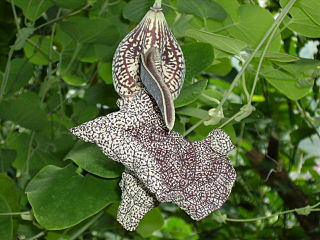
Aristolochia is a large plant genus with over 500 species that is the type genus of the family Aristolochiaceae. Its members are commonly known as birthwort, pipevine or Dutchman's pipe and are widespread and occur in the most diverse climates. Some species, like A. utriformis and A. westlandii, are threatened with extinction.

Acacia acuminata, known as mangart and jam, is a tree in the family Fabaceae. Endemic to Western Australia, it occurs throughout the south west of the State. It is common in the Wheatbelt, and also extends into the semi-arid interior.

Carpentaria acuminata, the sole species in the genus Carpentaria, is a palm native to tropical coastal regions in the north of Northern Territory, Australia.
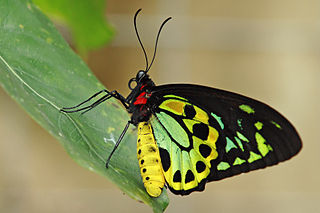
Ornithoptera euphorion, the Cairns birdwing, is a species of birdwing butterfly endemic to Queensland, and is Australia's largest endemic butterfly species. Other common names include Cooktown birdwing and northern birdwing. The names Cairns and Cooktown in its common name reference the Australian cities in the region where this butterfly is found.
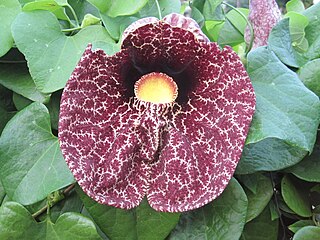
Aristolochia littoralis, the calico flower or مورپنکھ بیل or elegant Dutchman's pipe, is a species of evergreen vine belonging to the family Aristolochiaceae.

Stephania is a genus of flowering plants in the family Menispermaceae, native to eastern and southern Asia and Australia. They are herbaceous perennial vines, growing to around four metres tall, with a large tuber. The leaves are arranged spirally on the stem and are peltate, with the leaf petiole attached near the centre of the leaf. The name Stephania comes from the Greek, "a crown". This refers to the anthers being arranged in a crown-like manner.
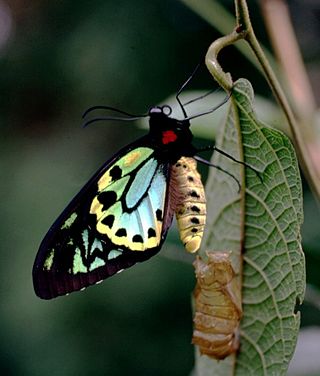
Ornithoptera richmondia, the Richmond birdwing, is a species of birdwing butterfly that is endemic to Australia. It is the second smallest of the birdwing species, the smallest being Ornithoptera meridionalis.

Wendlandia is a genus of flowering plants in the family Rubiaceae. It is found in northeastern tropical Africa, and from tropical and subtropical Asia to Queensland.

Aphanopetalum is a genus of twining shrubs or vines in the family Aphanopetalaceae which are endemic to Australia.
Crassula colorata, the dense pigmyweed or dense stonecrop, is an annual plant in the family Crassulaceae. The species is endemic to Australia, occurring in Western Australia, South Australia, New South Wales and Victoria.
Aristolochia boosii is a species of woody vine in the Aristolochiaceae plant family which is endemic to Trinidad and Tobago. Known only from a few locations in southern Trinidad, the species was first collected by Julius Boos in 1977. After determining that it was new to science, the species was described by Jacqueline Anne Panter in 1981 and named for its discoverer.
Ampelocissus acetosa is a species of vine. Common names include wild grape and djabaru.

Cissus hypoglauca is a common Australian vine. It is one of the better known climbing plants of the genus Cissus in the grape family. A very common climber in moist areas of eastern Australia, it often colonises large areas after forest damage due to storms, fire or logging. Common names include jungle grape, water vine, giant water vine, five-leaf water vine, jungle vine, native grapes and billangai.

Aristolochia praevenosa, synonym Pararistolochia praevenosa, is an Australian plant in the birthwort family, native to Queensland and New South Wales. The Richmond birdwing butterfly vine grows in subtropical rainforest in coastal areas north from Wollongbar, in far north eastern New South Wales and adjacent areas in south eastern Queensland. It has been recorded as far north as the Mary River. It also grows in tropical north eastern Queensland, where it is a food plant for the Cairns birdwing butterfly.

Maclura cochinchinensis, commonly known as cockspur thorn, is a species of vine or scrambling shrub in the family Moraceae. The native range extends from China, through Malesia and into Queensland and northern New South Wales. The species inhabits various types of tropical forest: most commonly in monsoon forests. The globular, yellow or orange fruit are sweet and edible and were a traditional food source for Australian Aborigines.

Diplocyclos palmatus is a vine in the family Cucurbitaceae. It is commonly known as native bryony or striped cucumber. In Marathi, it is called shivlingi due to its seed which resembles a lingam.

Tecomanthe burungu, commonly known as Roaring Meg Creek trumpet vine or pink trumpet vine, is a climber native to Queensland, Australia. The taxon was recorded in the Australian Plant Census in 2010 as Tecomanthe sp. Roaring Meg and formally described in 2018. Plants are cultivated for their ornamental pink tubular flowers.
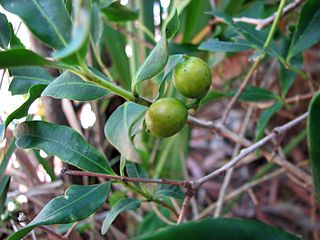
Alyxia spicata, commonly known as chain fruit, is a sprawling shrub or vine in the family Apocynaceae. It is native to New Guinea and the Australian tropics.
Dictyoneura is a genus of two-to-three species of rainforest trees known to science, constituting part of the plant family Sapindaceae.

Dipodium pictum, commonly known as brittle climbing-orchid or climbing hyacinth-orchid, is an orchid species that is native to Malesia and the Cape York Peninsula in Australia.
















